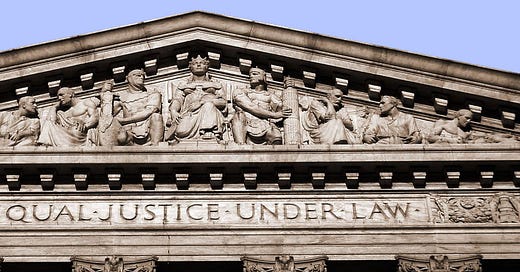The Supreme Court Takes a Crowbar to the Constitution
Sir Thomas More — the "Man for All Seasons" — and the Horrible Immunity Decision in Trump vs. United States
Plessy vs. Ferguson, Brown vs. Board of Education, Roe vs. Wade — even those with little interest in history remember the names of landmark Supreme Court cases because we know they changed the world.
The immunity case decided Monday by the Supreme Court is called Trump v. United States and never have we seen as succinct and accurate a description of what has happened to our beautiful, infuriating country.
This case is Donald Trump versus the United States we used to know or thought we did. It is Donald Trump versus the United States as a place where it's not OK if the president is a criminal. It is Donald Trump versus the United States that made sure these words were engraved on the marble pediment above the front entrance to the U.S. Supreme Court: Equal Justice Under Law.
Judge Tanya Chutkan will now hold evidentiary hearings that will air some of the evidence against Trump in open court. That mini-trial might be helpful for voters, but much of it will consist of motions and other legal wrangling. It’s no substitute for Trump in the dock and headed for conviction, which won’t happen — if it happens at all — for many months or years.
Rob Warden, my brother-in-law and the co-founder of Injustice Watch, among other important contributions to legal journalism, says the Supreme Court decision brings to mind a famous scene from Robert Bolt’s A Man for All Seasons.
When William Roper says he would cut down every law in England to get at the Devil, Sir Thomas More responds, “Oh? And when the last law was down, and the Devil turned 'round on you, where would you hide, Roper, the laws all being flat?”
Rob asks: “What if, with his new-found immunity, President Biden ordered the FBI to seize without warrants the six justices in the majority and hold them incommunicado at some secret gulag in the wilds of northern Alaska?”
“Where would the justices turn, the laws that would have protected them now being flat?”
Of course, Biden would never do that. In fact, I’m told he obliquely referred to the Sir Thomas More line in the 1991 Anita Hill-Clarence Thomas hearings. And that is my only consolation. We’ve had 45 men serve as president (Grover Cleveland is counted twice, which is why Biden, technically, is the 46th President). Many have lied, governed incompetently, and started the wrong wars. But only two of them — Nixon and Trump — have been crooks.
So, if we can begin the process of selecting a fresh, new, young Democratic nominee, maybe our luck will return. Trump will lose and, for a while, anyway, we can revert to the norm — a country where presidents don’t need immunity because they don’t break the law.
But even in that more hopeful world, we have to live with watching the Supreme Court take a crowbar to the Constitution.
"When the president does it, that means it's not illegal," Richard Nixon told David Frost in 1977. Now, Nixon's odious dictum is essentially the law of the land. As John Dean said on Monday, every crime would be immunized if Watergate happened now.
Chief Justice John Roberts' sweeping majority opinion — far broader than even pessimists anticipated — introduced the concept of "presumptive immunity," which is lawyer-speak for: Good luck bringing a case against a law-breaking president.
Roberts wrote a lengthy opinion that went out of its way to ignore the facts of the case, which are that Trump tried to stage a coup.
Parroting Nixon v. Fitzgerald, which granted presidents immunity from civil suits, Roberts stressed a distinction between "official acts," which are immune from prosecution, and "unofficial acts," which are not.
But then he mostly punts on distinguishing them, remanding the tough questions to the district court for endless dancing-on-the-head-of-a-pin litigation.
Roberts wrote that a president's motive for committing potentially illegal acts is inadmissible. What? In her dissent, an instant classic, Justice Sonya Sotomayor countered: Because motive cannot be considered, “the category of presidential action that can be deemed 'unofficial' is destined to be vanishingly small.”
Disallowing motive and intent is like saying you can't use a murder weapon with fingerprints as evidence.
Roberts feels sorry for presidents. He wrote that making presidents serve in office under “a pall of potential prosecution” will make them “unduly cautious.” That's unlikely, but over the centuries, it might have done something else: Deter them from breaking the law.
We know there will be no federal Trump trial before the election, and the case will be killed if he wins. But it's worse than that. As Biden said, this decision will embolden a reelected Trump to test the limits of what he can get away with. To paraphrase Lord Acton on power: Immunity corrupts, and absolute immunity corrupts absolutely.
Roberts goes out of his way to say flatly that the court is not giving Trump exactly what he wants. Yes, it is. SCOTUS made things more convenient for Trump’s lawyers by letting them hide behind this bogus distinction between "absolute immunity" (for what Roberts calls "core constitutional powers") and "presumptive immunity," a concept so broad, you could drive Clarence Thomas' RV through it.
Trump's already trying to do so. In the Manhattan hush money case, his attorneys claimed his conviction should be overturned because he signed the reimbursement checks to Michael Cohen in the White House, where he should enjoy presumptive immunity. This is ridiculous; hush money won’t likely be construed by New York courts as an “official act.” But Judge Juan Merchan must hear motions and rule on them, so he has postponed sentencing until September 18.
Roberts’ platitude that “immunity applies equally to all occupants of the Oval Office” is marginally useful. It means former President Biden would be protected by it, too, so a victorious Trump better not try to lock him up next year. Phew! Yes, it has come to that.
To understand why this decision stinks, it helps to read Sotomayor's lucid, persuasive, and ultimately depressing dissent:
Under the majority opinion, the president “will be insulated from criminal prosecution,” she writes. “Orders the Navy's Seal Team 6 to assassinate a political rival? Immune. Organizes a military coup to hold onto power? Immune. Takes a bribe in exchange for a pardon? Immune. Immune, immune, immune.”
Amazingly, Roberts never addresses the now-famous Seal Team 6 hypothetical, which can only mean that he sees no problem with the president ordering the military to assassinate political rivals.
Sotomayor makes mincemeat of her conservative colleagues, who pretend to believe in making decisions based on the founders' original intent. “The Framers clearly knew how to provide for immunity from prosecution,” she writes, “They did provide a narrow immunity for legislators in the Speech or Debate Clause [of the Constitution].”
But Article II, which covers the presidency, never mentions it. Why didn’t the founders put immunity there? Roberts, who should never be called a “moderate conservative” again, avoids the question.
Then Sotomayor briskly moves on to the part of the Constitution that says that an official impeached and convicted by the Senate “shall nevertheless be liable and subject to Indictment, Trial, Judgment, and Punishment, according to Law.” The impeachment clause “clearly contemplates that a former President may be subject to criminal prosecution for the same conduct that resulted (or could have resulted) in an impeachment judgment — including conduct such as 'Bribery,' which implicates official acts almost by definition.”
Originalism’s a bitch — unless you have a cynical and corrupt 6-3 majority.
There’s plenty more from founders. Alexander Hamilton wrote in the Federalist Papers that former presidents would be “liable to prosecution and punishment in the ordinary course of law.” Sotomayor explains how Hamilton was drawing an essential distinction between “the king of Great Britain,” who was “sacred and inviolable,” and the “President of the United States,” who “would be amenable to personal punishment.”
At the end of her fine opinion, Sotomayor writes: “ With fear for our democracy, I dissent.”
I fear for it, too, and so should all of you.






Jonathan, I’m 79 now & have seen lots of political water go under the bridge in my time on earth, but never any shenanigans like what we’ve seen this week. SCOTUS is very complicit in MAGA activity! Trump doesn’t even act surprised anymore!
It’s amazing that we and our Presidents managed 248 years without all this immunity mumbo-jumbo.